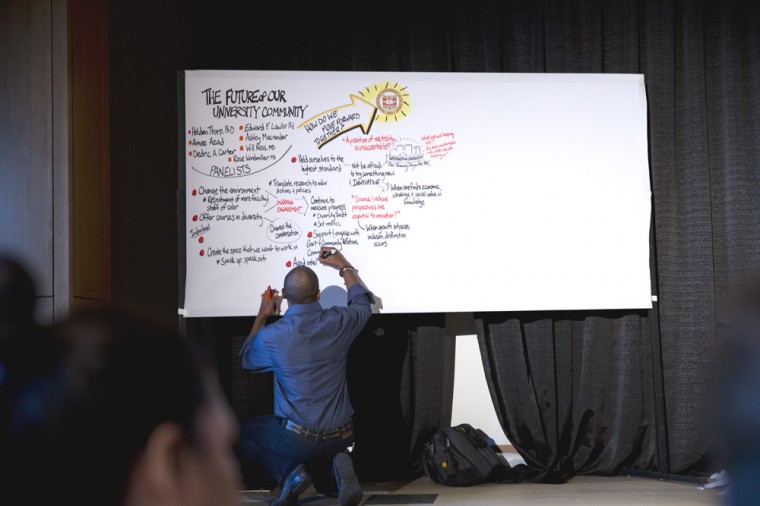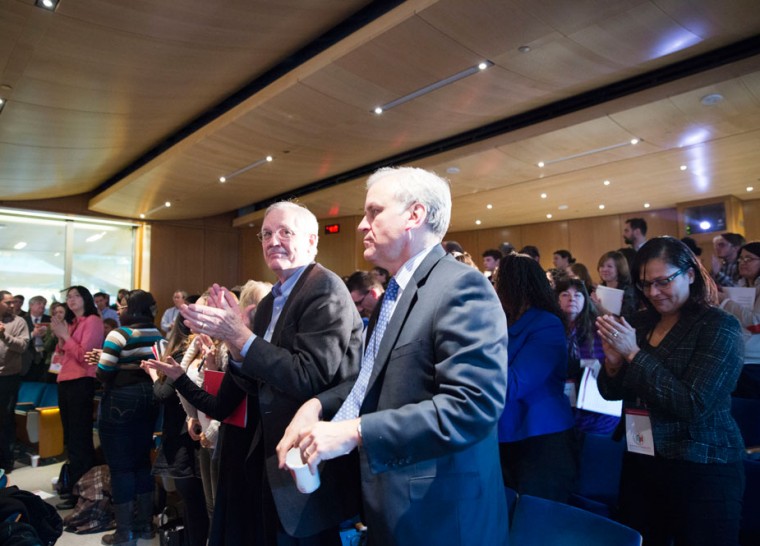News
WU gathers for Day of Diversity discussions
A University-wide “Day of Discovery and Dialogue” on the subject of race and ethnicity addressed issues of racism and diversity on campus that have become increasingly prominent following recent events in Ferguson.
The event took place over the course of two days, beginning with one session on the medical school campus on Thursday followed by four sessions in the business school on Friday.
The event’s central message was that it should serve as a jumping-off point rather than a finish line; administrators, faculty and students alike agreed that there was much work to do after the day of discussion in bringing more diversity and inclusion to campus and the St. Louis community.
 Megan Magray | Student Life
Megan Magray | Student Life Maketa Wilborn, a business management consultant, creates a visual representation of the important notes and quotes from the “The Future and our University Community” panel on Friday. The “Day of Discovery and Dialogue” started on Thursday night and extended through four panel discussions about issues of race and ethnicity the next day.
Provost Holden Thorp noted the importance of the day in solidifying Washington University’s hopes in moving toward greater diversity and inclusion.
“Sometimes in administration we tend to be overly focused on what the outside world says about what we’re doing or advice that we get from the outside,” Thorp said. “This is really an opportunity to affirm the fact that we have within our community the strength and intellect to confront these problems for ourselves and also for the world.”
Thorp said he feels that higher education plays an important role in providing opportunities to students and that Washington University should focus on providing opportunity to all, not just those of a higher socioeconomic status.
“In order for higher education to realize the promises that we all believe in bringing opportunity to America, we cannot tolerate a situation where we’re bringing that opportunity to some people and not others…If we believe what we say about higher education being a source of opportunity, we must confront and adapt and address those persistent disparities,” Thorp said.
The University opted to stream all sessions online for public viewing and worked to integrate artistic elements into the discussions as well. Art students depicted elements of the discussions through illustrations and a variety of other media as a part of a visual journalism project.
Their work was featured in the transition slideshows and on the “WashU Voices” website. Additionally, Maketa Wilborn, a business management consultant, portrayed each session’s highlights and important messages on large canvases through a combination of drawings and words.
Sessions throughout the second day covered topics including the importance of race, the social construction of race, race and ethnicity in everyday life, stereotypes and the future of these issues in the context of the University.
Denise Ward-Brown, associate professor of art, noted the importance of diversity for the sake of recognizing individualism.
“It’s important for this university to have all kinds of people so that we can traverse through different cultures, through different worlds, so that we can get to know people as individuals, so that people absolutely do not have to shoulder the burden for their entire culture,” she said.
Ward-Brown also expressed her disappointment in the depiction of blacks in the media.
“Any time a black person comes out and someone’s foot gets stepped on, all of a sudden, it’s a riot,” she said. “Anytime two or more [young people] are congregated in the name of blackness, it becomes a riot. It’s never just we’re standing up for our rights, it’s never just we’re asking for justice, it’s never nonviolent direct action.”
Freshman Kielah Harbert was glad to have had the chance to attend the event as a delegate because of her dedication to the issue of diversity but was disappointed by the University’s approach in getting people interested in the subject.
“It seems as if the people who come to these things are the people who are already interested, not people who are willing to expand their mind or just get a different perspective. And I think that’s something that should be addressed. Coming out of this, they want us to go back to our communities and talk to people, but we need to find a way to get those people here,” Harbert said.
On this subject, Associate Vice Chancellor for Innovation and Entrepreneurship Dedric Carter noted that sometimes the best thing to do in these cases is to continue speaking to the same group.
“We often say that we’re preaching to the choir because the same folks show up at these events, and that’s great. When you have a choir that’s wonderful and you’re trying to figure out how to get the message out, you go caroling,” Carter said.
 Megan Magray | Student Life
Megan Magray | Student Life Delegates and audience members stand and applaud during the “Day of Dialogue” event on Friday. Four panels of administrators, faculty and students throughout the day discussed various facets of the issue of racial inequality on campus and in the St. Louis community and ways to combat those problems.
Junior Shyam Akula, a panelist during the “Moving Beyond Stereotypes” session, discussed the importance of empathizing with others.
“It’s difficult to treat someone else’s experiences as real when you don’t experience them. It’s difficult, especially difficult, to treat someone’s experiences as real when that someone doesn’t look like you or doesn’t talk like you or maybe disagrees with you about political issues. When we have limited exposure to the stories and authentic experiences of other people, we fill in that limited information with stereotype,” Akula said.
Moving forward, Director of the Center for Diversity and Inclusion LaTanya Buck said she hopes to see more honesty in discussions about race and ethnicity.
“I get a sense that there is this culture of niceness and civility, of not wanting to offend, and I don’t think that this is a bad thing, but we have to move on. We have to be open to tell it like it is and also receive it like it is in productive ways,” Buck said.
Later, Buck noted the importance of still acknowledging race.
“You have to be in a position of power and privilege to be able to say what you don’t see. So when people say they don’t see race, I say I feel race. When people say they don’t see race, they say they don’t see me,” she said.
In concluding the event, Chancellor Mark Wrighton said he was pleased with the turnout but expressed a hope for more involvement on the part of the University community.
“It’s been noted that we had great participation for an event of this kind unprecedented in my experience here at Washington University. In terms of registration, we had at least 700 people sign up indicating that they would be present for one part of this program or another…but I think everyone here knows that the Washington University community is much larger,” Wrighton said.
“There are 13 or 14,000 students, 13,000 employees and about 35,000 alumni in this community…we do have a large presence in St. Louis. This is our hometown. We care about it. If St. Louis thrives, the University has a greater chance to thrive,” he added.
Senior Patrick Easley presented his thoughts at the conclusion of the event, recognizing the presence of racism on Washington University’s campus.
“During my four years at Wash. U., I have been stopped or followed by Clayton PD, St. Louis PD, [the Washington University Police Department], and [University City] PD. And these are things that continuously happen to African-Americans across all socioeconomic bases,” Easley said. “I think until we acknowledge that racism exists in everyday life in all minority groups, these problems will exist.”
